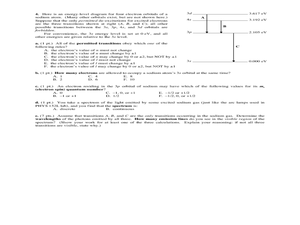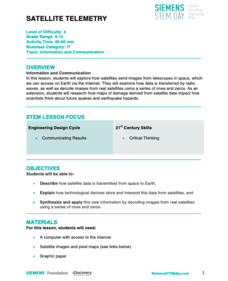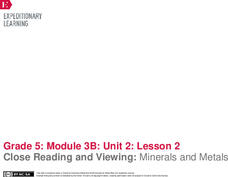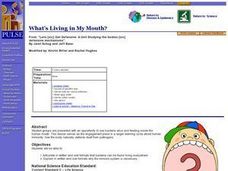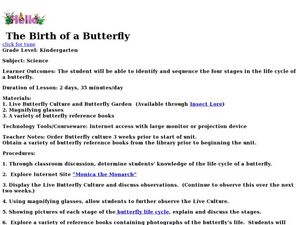Kenan Fellows
An Analytical Chemist, a Biochemist, an Animal Scientist, and an Oncologist Walk into a Lab...No Joke
Oncology presents multiple opportunities for research and the collaboration of many different types of scientists. Scholars divide into groups and research the history of mass spectrometry, polarity/non-polarity,...
Curated OER
Physics 152 Fall 2004 Final Exam, Parts A, B, C, D
At the end of a general physics course focused on light and electricity, you can administer this exam. Concepts covered include electromagnetism, circuits, induction, light rays, lenses and mirrors, characteristics of light, electron...
Sea World
Seals, Sea Lions, and Walruses
Learn about the mammals of the sea with a lesson about seals, sea lions, and walruses. Kids study the characteristics of each pinniped with flash cards and information, and then analyze data about elephant seals, measure heat loss...
NASA
Beginning Engineering, Science, and Technology
Space, the Final Frontier. The nine NASA-created challenges in this unit are designed to teach class members the engineering design process. Each challenge comes with teacher and student pages that can be used individually or as a...
Nuffield Foundation
Intrepreting Information about Sweating and Temperature
Why do we sweat? Scholars analyze data about body temperature, sweating, and other factors to better understand sweating. They note the changes after drinking ice water to sweating, skin temperature, and body temperature. Analysis...
Discovery Education
Satellite Telemetry
Satellites require rockets to launch, but it doesn't take a rocket scientist to understand them. Future engineers learn about how satellites send data to Earth and how to interpret satellite images. They see how radio waves play a role...
EngageNY
Grade 10 ELA Module 3: Unit 1, Lesson 1
Can people live forever? Scholars ponder the answer as they analyze an excerpt from The Immortal Life of Henrietta Lacks. As readers discover Lacks' immortal cells, they discuss how the author carefully sequences, connects and unfolds...
EngageNY
Close Reading and Viewing: Minerals and Metals
How easy is it to live off the land? Scholars read Minerals and Metals in Your Life and discuss how Canada's natural resources meet the needs of the people. Pupils watch a brief video and discuss the gist of the text and video. They...
Curated OER
Lives of Stars
Students take notes on the lives of stars. For this lesson on stars, students take notes alongside a PowerPoint presentation about the lives of stars.
Curated OER
The History of Life
In this history of life instructional activity, students review 4 vocabulary words associated with the beginnings of life. Students place these terms into a crossword puzzle and then complete 2 fill in the blank questions.
Curated OER
Characteristics of Living Things
Seventh graders identify the characteristics of living and non-living things. In this biology lesson, 7th graders define vocabulary words as they go through the lesson. They answer a crossword puzzle after class discussion.
Curated OER
What's Living in My Mouth?
High schoolers articulate in written and oral formats that bacteria can be found living everywhere. They explain in written and oral formats why the immune system is necessary. Students are presented with an opportunity to see bacteria...
Curated OER
Marine Field Trip to Whytecliff Park
Students study the intertidal habitat, tidal pools and the organisms that live in them. For this aquatic ecosystems lesson students take a field trip and experience first hand the local seashore environment.
Curated OER
Matching Worksheet: Life Science
In this matching worksheet, students match fifteen words to their definition. They identify words dealing life science such as cell, cell membrane, producer, and antibodies.
Curated OER
African Americans in Science
Middle schoolers examine the life of renowned African American scientists. In this science literacy lesson, students explore a website containing profiles and achievements of past and present African American scientists. They prepare a...
Curated OER
Goals of the Diversity of Life Unit
Students are introduced to the unit on the importance of diversity of life and the role that interdependence plays in our worlds. this is part of a multi-lesson unit on the diversity of life.
Curated OER
Life Cycle of a Star
In this space science worksheet, students locate 24 words relating to the live cycle of a star in a word search puzzle. They may self correct by selecting the link at the bottom of the page.
Curated OER
The Needs of Living Things
Learners watch video clips of animals and plants in their natural environment, to gather evidence that all living things have basic survival needs. Students draw pictures of real or imaginary pets eating, drinking, breathing, and taking...
Curated OER
The Life Cycle of the Butterfly
Students examine the life of a butterfly. They write a biography from the point of view of a caterpillar using new vocabulary. They use magnifying glasses to examine butterflies and caterpillars.
Curated OER
Life in the Ocean
In this ocean life worksheet, learners review the animal and plant plankton and photosynthesis in the ocean. Students fill in the blank of 15 statements and then find these terms in a word search.
Curated OER
How Do Plants Carry Out Life Processes?
In this plants worksheet, students write in how a plant's leaves, roots, and stems help it to live. This worksheet is a graphic organizer.
Curated OER
Nuclear Fleas
Seventh graders distinguish characteristics of living things and identify the importance of careful observation. They identify five things that are not alive, but display characteristics of life and list five things that are alive, but...
Curated OER
Butterfly Lesson Plans
Students study the life cycle of the Monarch Chrysalis. For this butterfly life cycle lesson, students study the monarch butterfly life cycle and focus on the fourth stage of the life cycle. Students draw a picture about the fourth stage...
Curated OER
The Birth of a Butterfly
Students explore the life cycle of a butterfly. In this butterfly lesson, students visit Internet websites, observe a live butterfly culture, and examine pictures of the stages of the butterfly life cycle in order to independently...



